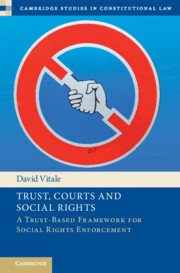Book contents
- Trust, Courts and Social Rights
- Cambridge Studies in Constitutional Law
- Trust, Courts and Social Rights
- Copyright page
- Contents
- Acknowledgements
- Table of Cases
- 1 Introduction
- 2 Conceptualising Trust in the Social Rights Context
- 3 The Citizen–Government Relationship in a Network of Trust Relationships
- 4 A Trust-Based Framework for Enforcing Social Rights?
- 5 The Expectation of Goodwill
- 6 The Expectation of Competence
- 7 The Expectation of Fiduciary Responsibility
- 8 Conclusion
- Bibliography
- Index
- Cambridge Studies in Constitutional Law
7 - The Expectation of Fiduciary Responsibility
Published online by Cambridge University Press: 08 February 2024
- Trust, Courts and Social Rights
- Cambridge Studies in Constitutional Law
- Trust, Courts and Social Rights
- Copyright page
- Contents
- Acknowledgements
- Table of Cases
- 1 Introduction
- 2 Conceptualising Trust in the Social Rights Context
- 3 The Citizen–Government Relationship in a Network of Trust Relationships
- 4 A Trust-Based Framework for Enforcing Social Rights?
- 5 The Expectation of Goodwill
- 6 The Expectation of Competence
- 7 The Expectation of Fiduciary Responsibility
- 8 Conclusion
- Bibliography
- Index
- Cambridge Studies in Constitutional Law
Summary
This chapter addresses, as a third component of the proposed framework, the third constituent expectation of trust in the citizen-government relationship: fiduciary responsibility. Employing scholarship on both private fiduciary law and fiduciary political theory, it defines the expectation as an expectation that the elected branches will fulfil their fiduciary duty of loyalty to citizens. This duty translates, the chapter argues, into an expectation of non-corruption from the elected branches’ staff. The chapter also details how the courts can enforce the expectation. It explains that for this component, the courts aim to curb corrupt practices from the elected branches’ staff, and it identifies steps the courts can take to do so: greater probing into the state’s financial resources; strictly enforcing public procurement law; holding non-state actors accountable to the public; involving specialised anti-corruption agencies; and imposing financial sanctions on government actors. The chapter illustrates these steps using cases from various jurisdictions, including South Africa, Uganda and the UK.
Information
- Type
- Chapter
- Information
- Trust, Courts and Social RightsA Trust-Based Framework for Social Rights Enforcement, pp. 195 - 232Publisher: Cambridge University PressPrint publication year: 2024
